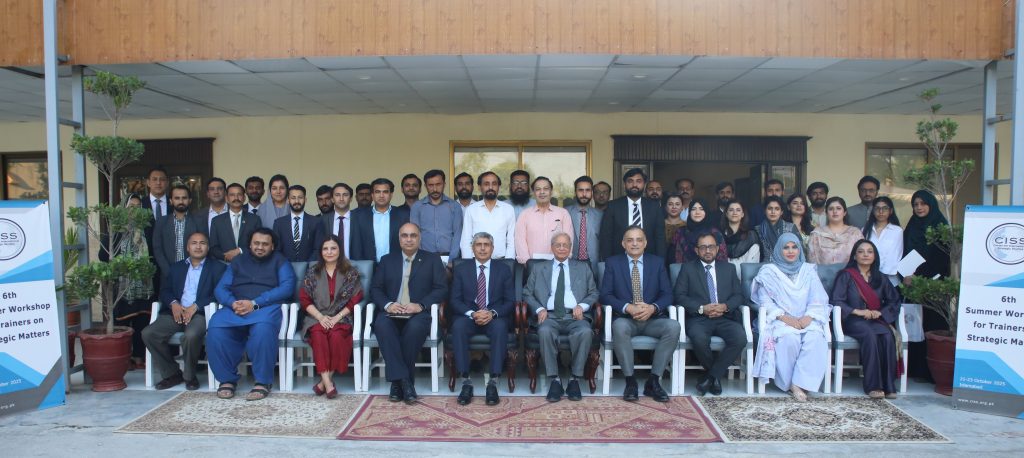The three-day CISS workshop featured engaging discussions on strategic stability, deterrence, emerging technologies, and the indigenization of strategic studies in Pakistan.
Adviser to Nuclear Command Authority (NCA) Lt General (retd) Mazhar Jamil has reminded the world that Pakistan would continue to uphold its policy of “quid pro quo plus”, thereby reinforcing strategic stability in South Asia.
“Pakistan stands fully prepared to respond to any act of aggression, strategic, operational, or tactical, with resolve and capability, ensuring the preservation of deterrence equilibrium in the region.”
He was speaking at the concluding session of the 6th Workshop for Trainers on Strategic Matters, organised by the Centre for International Strategic Studies (CISS). Lt Gen (retd) Jamil, who had served as director general of Strategic Plans Division (SPD), warned that “India’s growing overconfidence, rooted in its aggressive military doctrines and ideological assertiveness, continues to heighten the risks of miscalculation. “Such tendencies, if left unchecked, could seriously undermine regional peace and stability,” he added.
He cautioned that great power politics led to discriminatory transfer of advanced and emerging technologies to India, undermining the strategic balance in South Asia. “Great power politics has facilitated a discriminatory transfer of advanced and emerging technologies to India, thereby undermining the strategic balance in South Asia. Such preferential access is reshaping the regional security paradigm and transforming the nature and character of warfare across the region,” he said, providing understanding of strategic and nuclear issues shaping Pakistan’s security discourse.
The former SPD chief said international support had emboldened India to act with growing assertiveness in the region. “Emboldened by these external enablers and strategic partnerships, India has increasingly exhibited adventurist tendencies, particularly evident in the post-Pahalgam incident,” he noted.
Referring to the Pakistan–India confrontation in May following the so-called Pahalgam incident, Gen Jamil said the episode had “effectively challenged India’s misplaced notions of escalation dominance and escalation control”. He recalled that “Pakistan once again demonstrated restraint and responsibility, reaffirming the credibility and maturity of its nuclear deterrence posture.”
Warning about the broader regional implications, Gen Jamil said India’s Hindutva-driven nationalism poses a “grave challenge to regional peace and strategic stability”. He said India’s evolving policies reflect “the ideological and strategic imprint of Chanakya’s Mandala Theory, which prioritises power politics and regional dominance”.
“India’s increasingly offensive military doctrines, coupled with a culture of coercive behaviour, underscore both its intent and capability to project aggression in the region,” he cautioned. Gen Jamil further said that credible evidence exists of India’s continued sponsorship of proxies in the region, a destabilising pattern that runs counter to its professed commitment to peace.
The workshop featured participation from faculty members of major Pakistani universities and research institutions, including the University of the Punjab, Fatima Jinnah Women University, Quaid-i-Azam University, and the National University of Modern Languages. The participants also visited the Pakistan Institute of Nuclear Science and Technology (PINSTECH), where they were briefed on Pakistan’s achievements in civil nuclear energy and scientific advancement.





